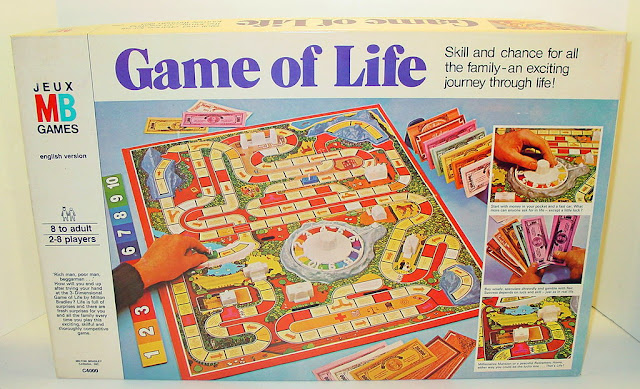The Game of Life
The Rules of the Game of Life
That's what I've been looking for all my life - The Rules that will make it easier or at least less painful to navigate life.
We all have an idea of what the Game of Life is about. For me it has been about working out the rules to a level of certainty that allows me to finally relax and enjoy it. For some it is about collecting the most gold tokens. For some the most virtue points. For others it's about popularity, loveability, knowledge, skilfulness, perfecting freedom, deeply knowing ourselves or perfectly expressing our inner world. And for almost all of us either pain-avoidance or unequivocal proof we have been cruelly mistreated. We all have a set of rules that we think will get us what we fundamentally want. That feeling of being complete, belonging, loved, that our existence matters.
In Western countries we all start our lives this way, putting our token on the board of the game. It is a natural consequence of our awareness of something missing combined with the family and education expectations of us, and the idea that time is linear. The rules we are told and the rules we deduce.
And the biggest rule is that in order to get what we want in the Game of Life we have to plan for the future and take steps towards our goals.
I think it's commonly understood now that this idea is mistaken, at least in theory. It's not that following the rules of the Game of Life won't get us the result we are aiming for. Often it does. But it is fundamentally mistaken about what we are and what will make us contented.
We are not the token on the board, we are the player.
We are outside the game.
And, returning to my cryptic remark about linear time, it isn't about stepping into a better future, it's about being fully in the life we are in right now, as the cycles of life move us.
Can you bypass the pain of playing the game?
It would be nice to think that it were possible to circumvent this massive detour on the road to happiness. And there is hope that there may be a shortcut for some. But it looks very much as if for the vast majority of us we have to do what our rules drive us to do, until life helps us work out the truth for ourselves. It's almost as if this misunderstanding and striving is a necessary part of getting to a better perspective.
Whatever the specific rules of your personal game, that is the world you see out there. Telling you that it isn't what it seems isn't going to hit home until you have some personal experience of that. After all everyone's different, right?
Where can you get help on the path?
It may be that society as a whole, our Western culture, makes this a more difficult path. Eastern Hindus and Buddhists certainly seem to think so. Whatever culture we grew up in we are each responsible for working it out for ourselves. But we aren't alone.
I believe that this is what religions are for - to give us pointers on this particular perspective change from the board game of life to the reality of it. And given our cultural ambivalence about religious institutions there are some non-religious organisations with the same aim - to help us find the way. Some are culturally embedded to the extent that it would be very difficult to use them if you aren't from that culture eg Hinduism, Judaism.
There is no monopoly on how to get there. And there's nothing intrinsically wrong with organisations that believe there is. They're just trying to help and believe that's the best way to do it.
Some of the styles I've found, in no particular order, and certainly far from all of those out there are: Most contemplative versions of Christianity, Western Buddhism, Zen Buddhism, Alan Watts, Sydney Banks' The 3 Principles, The Inside-Out understanding, Existentialism
I think the thing to do is to pick one that seems right for you, and stick with it as much as you can. But that's just my rule for myself. You decide.
The Limping Shrink Rule 3: The game you are playing is not your life

.jpg)


Comments
Post a Comment
Tell me what you think about this idea, your experiences, or just what comes to mind when you read this.